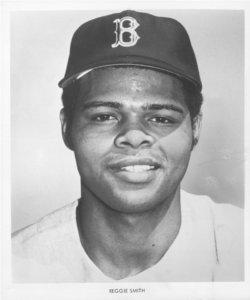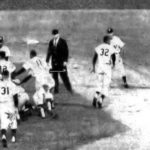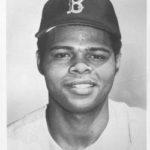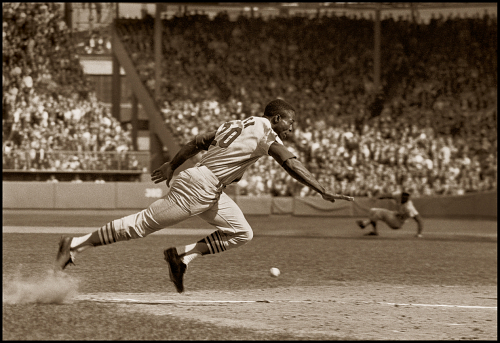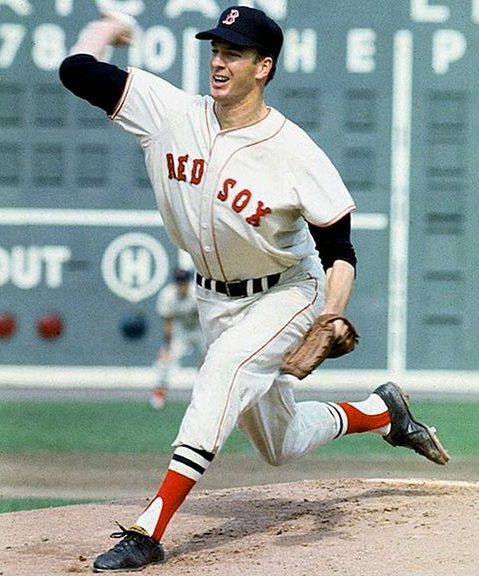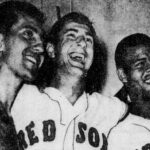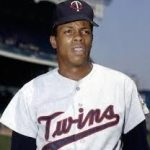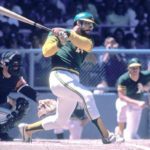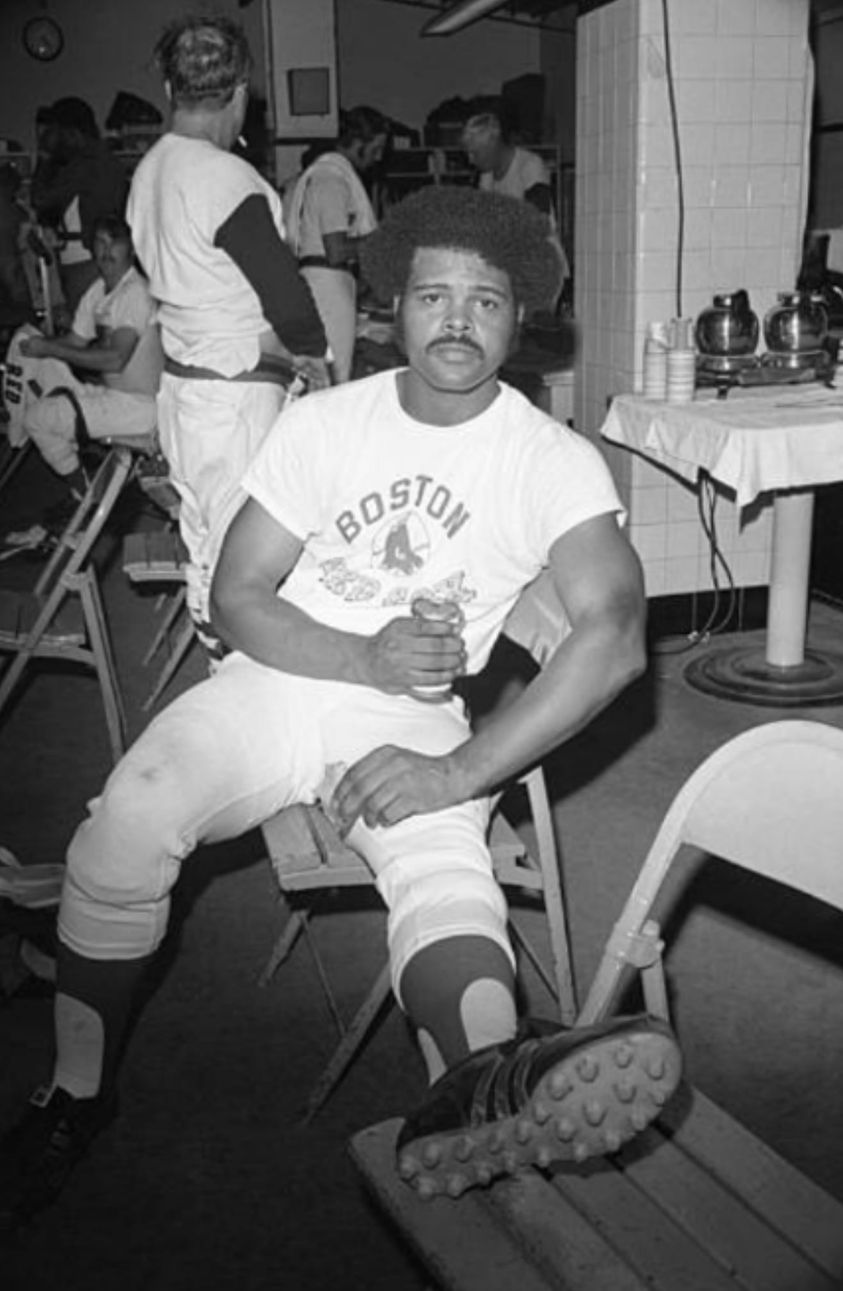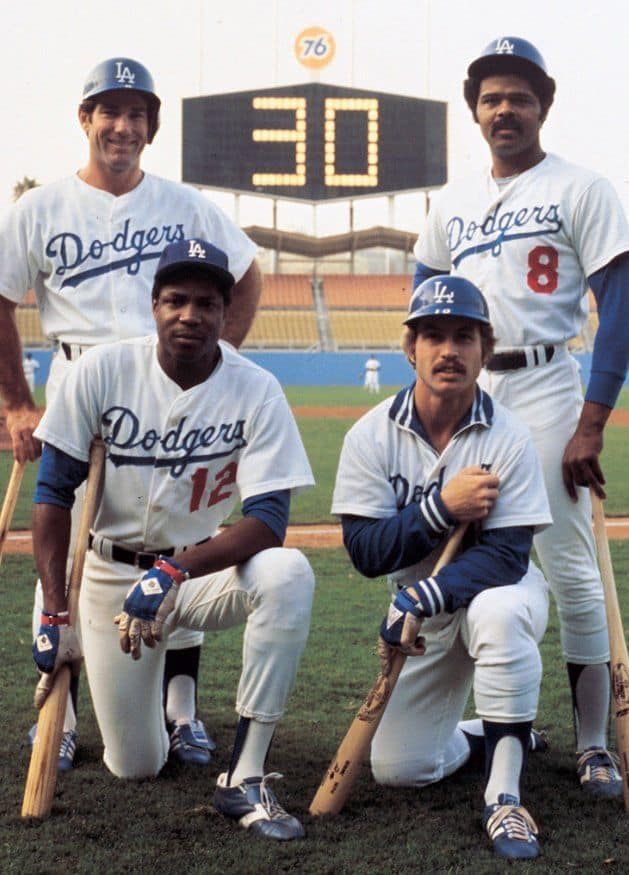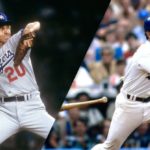Reggie Smith Stats & Facts
Reggie Smith
Positions: Outfielder and First Baseman
Bats: Both • Throws: Right
6-0, 180lb (183cm, 81kg)
Born: April 2, 1945 in Shreveport, LA
High School: Centennial HS (Compton, CA)
Debut: September 18, 1966 (10,147th in MLB history)
vs. CAL 5 AB, 0 H, 0 HR, 0 RBI, 0 SB
Last Game: October 3, 1982
vs. LAD 3 AB, 0 H, 0 HR, 0 RBI, 1 SB
Full Name: Carl Reginald Smith
View Player Bio from the SABR BioProject
Nine Players Who Debuted in 1966
George Scott
Sal Bando
Reggie Smith
Rick Monday
Nolan Ryan
Don Sutton
Bob Watson
Nate Colbert
Stan Bahnsen
All-Time Teammate Team
Coming Soon
[jetpack_subscription_form title=”Subscribe to This Day In Baseball” subscribe_text=”Get our latest Posts in your in box” subscribe_button=”GO” show_subscribers_total=”1″]
Notable Events and Chronology for Reggie Smith Career
An ambidextrous, all-state high school football and baseball player from California, Smith had a tryout with Houston at Dodger Stadium his senior year, but signed with Minnesota as a shortstop in 1963. Left unprotected by the Twins after his first pro season, the strong-armed switch-hitter was drafted by the Red(`-h)h)h)Sox, who made him an outfielder. As a rookie, he helped Boston to the 1967 pennant and homered twice in the World Series. A fixture from 1967 through 1973 in potent Fenway outfields, first in center, later in right, he batted .300 three times and won a Gold Glove in 1968 when he led AL outfielders in putouts. In 1968 and 1971, he topped the league in doubles.
Traded to St. Louis with Ken Tatum for Rick Wise and Bernie Carbo in October 1973, Smith had two All-Star seasons for the Cardinals in 1974 and 1975. He hit three HR in a May 22, 1976 game before moving on to the Dodgers in June. On the way to the 1977 NL pennant, Smith, Steve Garvey, Dusty Baker, and Ron Cey became the first four teammates in baseball history to each hit 30 or more HR; Smith hit a career-high 32. He was a major factor in the Dodgers’ 1978 league title, hitting a club-high 29 HR, and adding three HR in the WS loss to New York.
Shoulder, neck, knee, and ankle injuries plagued Smith in his final four ML seasons. He batted .284 as a Giants first baseman in 1982 before signing to play in Japan. He retired second to Mickey Mantle in HR by a switch-hitter; as the only switch-hitter with 100 HR in each the AL and NL; and as the only player to homer from both sides of the plate in a game twice in each league. Only Smith and Frank Robinson appeared in WS and All-Star Games for both leagues.
Japan
Reggie Smith was contacted by the Yomiuri Giants in 1982 but instead went to the San Francisco Giants when Yomiuri refused to disclose finances in detail. The next season Yomiuri offered Smith three cars and a million-dollar contract, more than doubling what San Francisco had been paying. They also allowed Smith to become the first player in Yomiuri history to have facial hair or a long hair-style (Reggie had an Afro at the time).
It was obvious from the get-go that Reggie’s personality was too different from the Japanese norm. He got into arguments with coaches like Isao Shibata and criticized pitchers who would not offer him a pitch in the strike zone. In April of 1983, he injured his knee while sliding and was relegated to the bench for almost two months, earning him the media moniker “Million-Dollar Bench-warmer”. While unable to play the field, Smith was used as a pinch-hitter. One game he was in the on-deck circle when the batter doubled. He told manager Motoshi Fujita to let someone else bat instead, as he would be pitched around. Fujita agreed but the media made it into a scandal and called for Smith’s release. The argument was made that Smith was encouraging Americans to look down on Japan and was not taking Japanese culture, baseball or business seriously. Additionally, Smith was the target of many racial insults, especially from Hanshin Tigers fans.
While Smith hit well after he was healed, he also struck out a lot and became known as the “Giant Human Fan”. He also started to criticize the umpires; like many other gaijin he felt that they employed a double standard, using a larger strike zone for foreign players. Once Reggie intentionally struck out to drive home his point, drawing more criticism for a lack of effort.
In August 1983, Smith donned his uniform backwards with the help of his teammates. He then ran backwards onto the field, stunning the assembled crowd and infuriating his coaches further. When he was ordered off the field and prevented from taking batting practice by Shibata, he came back to hit a 3-run homer that game.
Also that month he became the target of inside pitching by the Hiroshima Carp. Manabu Kitabeppu started a brawl with back-to-back high-and-inside pitches to Smith, for which Reggie got all the blame. Before one game Smith (through an interpreter) addressed the Carp bench, telling them not to throw any more beanballs or insult him. They did not challenge Reggie, who hit a crucial 3-run homer in a win that helped the Giants pull away from Hiroshima in the pennant race. Legendary Giants owner Matsutaro Shoriki said that Yomiuri would not have won the pennant without Smith and said that a million dollars was a low price for what Reggie had contributed on the field.
Overall Reggie hit .285/.409/.627 with 28 long balls in just 263 AB. He had fanned 61 times and drew 51 walks, for a Three True Outcomes Percentage of 43.3%. He would have led the league in slugging had he gotten enough plate-appearances to qualify for that title.
At age 39, Smith’s abilities declined rapidly. He hit .255/.342/.511 in 1984 with 66 K and 17 HR in 231 AB. He injured his wrist, shoulder and knee that season, following a slew of injuries in the US. He also knocked out one Hanshin fan who had been vocal in his racist insults. The next day a gang of Tigers fans attacked Reggie and his son, Reggie Smith Jr. He was charged with and cleared of assault for this latter incident.
While Smith was very critical of Japanese baseball (calling it 50 years behind the times and forced labor), he incorporated some of Sadaharu Oh’s methods into his coaching with the Los Angeles Dodgers after his retirement. He became close friends with Yomiuri star Tatsunori Hara and thought very highly of Oh.
@ET-DC@eyJkeW5hbWljIjp0cnVlLCJjb250ZW50IjoicG9zdF90YWdzIiwic2V0dGluZ3MiOnsiYmVmb3JlIjoiTGVhcm4gTW9yZSBhYm91dCB0aGUgdGVhbXMsIHBsYXllcnMsIGJhbGwgcGFya3MgYW5kIGV2ZW50cyB0aGF0IGhhcHBlbmVkIG9uIHRoaXMgZGF0ZSBpbiBoaXN0b3J5IC0gLSAtIC0gLSAtIC0gIiwiYWZ0ZXIiOiIiLCJsaW5rX3RvX3Rlcm1fcGFnZSI6Im9uIiwic2VwYXJhdG9yIjoiIHwgIiwiY2F0ZWdvcnlfdHlwZSI6InBvc3RfdGFnIn19@
[jetpack_subscription_form title=”Subscribe to This Day In Baseball” subscribe_text=”Get our latest Posts in your in box” subscribe_button=”GO” show_subscribers_total=”1″]
Factoids, Quotes, Milestones and Odd Facts
A five-tool player with the Red Sox, Reggie Smith was one of the first African American superstars in Boston. A switch-hitter with power and speed, Smith batted .300, hit 30 homers, stole 20 bases, and won a Gold Glove for the Red Sox. But he was traded to the Cardinals after the 1973 season, and spent the remainder of his career in the National League. As he matured, the quiet Smith evolved into a power hitter, belting 32 homers for the 1977 pennant-winning Dodgers, and 29 more the next year when they repeated. By the time he was part of a World Series winner, in 1981, he was injured and near the end of his career. Though he never received much of the acclaim he should have, Smith was an All-Star for three different teams, and was well respected by his teammates.
Quotes From Reggie Smith
“I’ll try to hit a home run, but only in a certain situation, when a home run is in order. I’ll try to get an extra-base hit when it’s in order. And I’ll hit into a double play, and give up an at-bat, if that’s what it takes to score a run. I’ll take a walk – anything – if it’ll help us win.”
“I’ve never been one who cared about a lot of praise. I guess it’s nice, but really, I don’t concern myself with what people say about Reggie Smith.”
Best Season: 1977
Though Steve Garvey and the pitching staff received much of the attention for the 1970s Dodgers, Reggie Smith was the most effective offensive performer for the 1977-1978 clubs. In ’77, he joined three other Dodgers (Garvey, Ron Cey, and Dusty Baker) as the first quartet in NL history to all hit 30 homers. Helped in large part by his 104 walks and .307 average, Smith scored 104 runs in 148 games, with a .576 slugging percentage. In the World Series, he tried his best to keep up with that other Reggie (Jackson) – hitting three homers in the six games.
Post-Season Appearances
1967 World Series
1977 National League Championship Series
1977 World Series
1978 National League Championship Series
1978 World Series
1981 National League Championship Series
1981 National League Division Playoffs
1981 World Series
Awards and Honors
1968 AL Gold Glove
Notes
Smith started the 1980 season with an 11-game hitting streak, and ended May with a 12-game streak. He was hitting .335 in early June and had already surpassed his homer and RBI totals of the previous season.
Injuries and Explanation for Missed Playing Time
Smith had a trying year in 1979. Just after the All-Star break he collided with Dusty Baker while chasing a fly ball and missed several weeks. He complained of ankle pain all season, but it took six weeks for the Dodgers’ training staff to figure out what was wrong. He had a seven-inch tear in the membrane of his right ankle. The injury could only get better through rest, and he’d been playing on it all season. As he played, some of his teammates blamed him for the team’s struggles. Finally, Smith called a clubhouse meeting and cleared the air. he felt he was being unfairly blamed for the team’s difficult season. The ankle took six months to mend, and he was ready and recharged for the 1980 season. He had hit just 10 homers with 32 RBI in ’79… Underwent shoulder surgery in the 1976 off-season.
Hitting Streaks
19 games (1969)
15 games (1968)
15 games (1970)
Transactions
Smith was acquired by the Dodgers from the Cardinals minutes before the June 15th trade deadline in 1976.
All-Star Selections
1969 AL
1972 AL
1974 NL
1975 NL
1977 NL
1978 NL
1980 NL
Other Resources & Links
Coming Soon
If you would like to add a link or add information for player pages, please contact us here.

